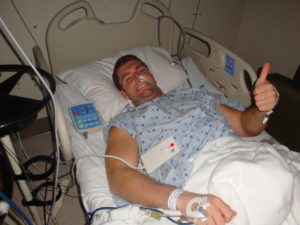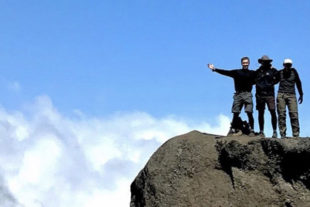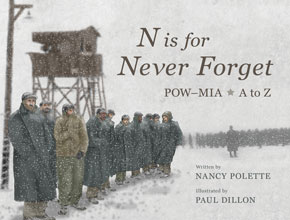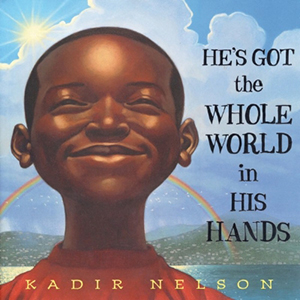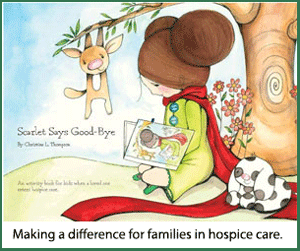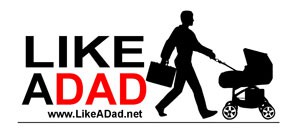For Chris Stricklin and Joel Neeb, coauthors of Survivor’s Obligation: Navigating an Intentional Life, two very different and extraordinary survival experiences sparked a common journey of healing. Now their mission is to invite other survivors to join them.
Chris ejected from the F-16 he was piloting as a member of the U.S. Air Force Thunderbirds, just moments before it crashed into the ground at an air show. Joel’s survival journey began in a very different way. Also an air force fighter pilot, he was diagnosed with stage IV cancer and given little hope of survival.
Both men beat the odds and survived. When they decided to write a book together, they discovered that writing about life after survival was more difficult and at the same time more healing than either of them expected.
“When we first put pen to paper,” Chris recalls, “I could not relive the 25.25 seconds of flight before the ejection without tears streaming down my face. I could not explain the emotions I felt and the remorse for what I put my family through. Now, I am able to not only recount the moments but discuss the experience and emotions surrounding the event.”
Joel says the process of writing the book, reliving and revisiting difficult experiences, was longer and more exhausting than either of them expected.
“I can also say that it has been an endlessly fulfilling process full of learning, reflection, and an affirmation of my purpose,” he says. That purpose, the coauthors agree, is to share their stories as a way to connect with other survivors in need of understanding and encouragement.
Chris and Joel met several years after their individual traumatic brushes with death. They had both left military service and were part of the same consulting firm. Recognizing what they had in common, Chris and Joel each found comfort in connecting with someone else who had come so near to death. They were able to talk freely about their experiences and the effects on their lives, both negative and positive. These painful yet beneficial conversations grew into a healing friendship, inspiring Chris and Joel to reach out and help other survivors find healing connections as well.
“We didn’t write this book to become bestselling authors,” says Joel. “We wanted to reach out to others, to create a community of survivors. We are bringing together survivors of all types of adversity to commit to living a story of post-traumatic growth.”
Sometimes writing about and reliving their worst days was as unbearable as living through it the first time, but positive connections have arisen from retelling those stories. Joel met another fellow survivor because he wrote about “the worst day” of his life. It was the day he walked into the University of Texas MD Anderson Cancer Center in Houston, Texas, knowing he had stage IV cancer and believing he didn’t have long to live.
“As I was about to walk into the cancer hospital for the first time, it dawned on me that I was going to die in one of the rooms in this building. Probably soon. I closed my eyes and begged God to heal me,” he remembers. “When I opened my eyes, I saw her. Ten years old, bright blue eyes, body ravaged by cancer, being wheeled into the hospital by her father. At that moment, every ounce of self-pity was gone. I was 33, living my dream as a fighter pilot with an amazing family. I was the luckiest guy in the world, and this beautiful little girl might not live to be a teenager.”
Joel says that was a turning point for him, when his self-pity and depression over his diagnosis gave way to gratitude and determination to make the most of his life, however long or short.
“I often say God did heal me that day, though not in the physical way I wanted,” says Joel. He has shared the story of his encounter with the blue-eyed little girl in presentations and also in Survivor’s Obligation. “I always wondered what became of her, and hoped that somehow, she was aware of the impact she’d had on my life.”
When Chad Barrett read Joel’s story, he realized his daughter Kristina could have been the girl Joel described. The timing, the place, and the blue eyes were spot on. Chad contacted Joel to tell him the rest of Kristina’s story.
Chad and his wife, Melissa, found out that their eight-year-old daughter Kristina had clear cell sarcoma, an incurable form of cancer, in 2010, the same year Joel was diagnosed with mucinous adenocarcinoma.
“Kristina was always a spunky little girl. She always smiled at life,” says Chad. “As humans we all have our ups and downs, but she was never one to give up easily. We try to teach all of our kids not to give up.”
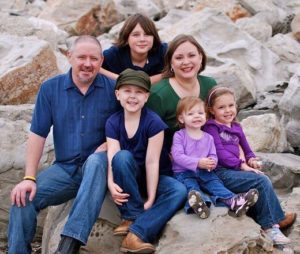
Chad Barrett (left), and his wife Melissa in 2010 with their children, Kristina (center), Jonathan (top), Katherine, and Caroline (bottom right).
In 2013, Kristina participated in a clinical trial for a treatment that gave the Barrett family hope. However, the cancer returned just a few months later, in early 2014. When the doctors told Chad and Melissa the cancer had returned, there was no other treatment available.
“We had to tell Kristina it was back and that the doctors said there’s nothing else we can do,” Chad says. “She cried and then got really quiet, like she was in deep, deep thought for several minutes. After that, she was okay. Until her last breath, she was okay. I wish I could have known what she was thinking in those minutes, but I know it was the Lord speaking to her heart. We’re Christians, and our faith in Jesus is our backbone. It definitely was for her.”
Kristina died in 2014, soon after her twelfth birthday.
“Watching an eleven- or twelve-year-old face that, knowing death is coming, with her faith as an anchor was the most inspiring thing for us,” her father says. “She taught us that we have the option to let pain overcome us or we can overcome it by standing strong and knowing this doesn’t have to destroy me unless I allow it to. It’s our option.”
Although it’s hard to say for sure whether the young girl Joel saw was Kristina, even the possibility is meaningful to Chad. For Joel, it was hard to hear that the girl with the beautiful blue eyes was gone.
“I was devastated,” he says. “My life-changing moment was part of another family’s heartbreak.”
But Chad says hearing about Joel’s encounter with Kristina gave them a measure of closure.
“It brought things full circle,” he says. “It gives some purpose to our pain, knowing that Joel was brought out of a dark pit by meeting her. It changed the way he lives. Now he’s reaching out to other people with his story, and it brings even more purpose to our story.”
For the authors, this is what creating a community of survivors is all about, bringing purpose to the pain and extending encouragement to those who need it. Writing their stories also opened up conversations in the authors’ families to talk about their trauma, helping them to grow stronger together.
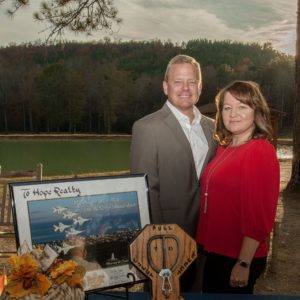
It took years for Chris and his wife Terri to talk about their experience dealing with his accident.
Part of Chris’s story in Survivor’s Obligation is his hesitance to talk about the accident for many years after it happened and the post-traumatic stress he at first denied. He writes that he and his wife, Terri, were finally able to talk about it, and Chris says the process of writing the book created even more conversations and more healing for his family.
“We openly talk about both the event and the impact now,” he says. “I make progress every time we talk, and we better understand one another’s triggers and soft spots.”
Joel says his story is also his family’s story. He recounts in the book that doctors discovered his son J.J., four years old at the time, had a tumor in his lung. The tumor turned out to be benign, though the surgery to remove it involved removing a portion of his lung. Like Joel, J.J. has recovered, but their health scares happening in tandem added to their fears.
“It was therapeutic for our family to share our fears and emotions as we captured these stories in print,” says Joel, adding that he and his family read portions of the book together, laughing about the lighter moments and talking through the scarier ones.
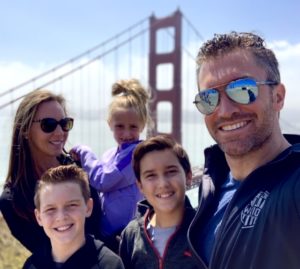
Joel (right) and his wife Marsha, daughter Makayla, and sons Jace and J.J. read portions of the book together and talk about how they can make the most of each day individually and as a family.
Sharing those fears and trauma with their families was an essential step for Chris and Joel. Sharing their stories with readers and audiences brings another level of healing and purpose, they say. Chris leads recruitment and training for Dunn Investment Company. Joel is CEO of Afterburner, Inc., a leadership consulting firm. Both travel and speak widely about leadership and the importance of intentional living, often sharing their survival stories.
“Each time I tell my story to others, focusing on their growth and how I can play even a minor role in that, I am able to more fully embrace my life,” Chris says. “The focus on them allows me to dive deeper into my own feelings, emotions, strengths, and weaknesses.”
Chad says he also discovered the healing power of telling his story of loss. He first talked about it publicly about five months after Kristina died. He still takes many opportunities to tell her story and his, appearing on a national news program alongside Joel to share how they were connected by Kristina.
“I like talking about Kristina, first, because I don’t want people to forget her,” says Chad. “I also like talking about her because it helps me put my thoughts in order. Sometimes it’s easy, sometimes it’s not. I get emotional sometimes, but I’m not afraid to cry in front of people. It’s very healing for me, and it helps me when I know that what I say can help others. People do not like talking about their pain, but when they see one person can do it maybe they can do it too.”
Telling his story and Kristina’s and encouraging other people in their faith is part of Chad’s sense of survivor’s obligation. He says being identified as a survivor was a turning point in his life. About a year after his daughter’s death, he recalls a friend calling him a survivor.
“That did something to me,” he says. “Somebody recognized that I’ve passed through the fiery furnace, through the darkness and the pain and I’m on the other side, and I’m still here. It didn’t destroy me. When you’re in the thick and thin of it all, it’s hard to keep your eyes in the bright spots … to say good things to yourself and hear good things from others. On the other side of it you’re still trying to process a lot of it. When somebody recognizes you’ve passed through it, you survived, it’s huge.”
Being recognized as a survivor is empowering for him.
“It’s not some cool feel-good thing. It’s life-changing, life altering,” Chad says.
Authors Chris and Joel are connecting with other survivors as part of an initiative they call Live the Obligation, which aims to create connections and empowerment for survivors of all kinds.
“Lowering our emotional walls and owning our vulnerabilities and struggles gives permission and motivation for others to do the same,” says Chris. He and Joel hear regularly from survivors like Chad who have been moved to share their stories and open up about the pain they have survived. The power of the theme Live the Obligation, they all agree, is to share stories by listening and telling.
The purpose of the initiative for Chris and Joel is to create a platform for fellow survivors to support one another virtually. They hope it will grow from a reactive community to a proactive one that will reach out to others in need to help them grow from their experiences.
Of his experience, Joel says “I wouldn’t go through it again for a million dollars, but I wouldn’t give up the lessons I took from the experience for a hundred million dollars.”
“The seed was sharing our worst life experience,” says Chris. “My only yearning was to make my near-death experience mean something. Through these growing interactions, it does. To me and to others. This motivates me daily to be more, do more, live more.”
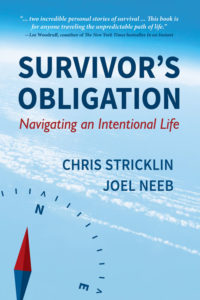 Survivor’s Obligation
Survivor’s Obligation
Facebook: /SurvivorsObligation
Press page: ElvaResa.com/book/survivors-obligation
Chris Stricklin
Web: ChrisStricklin.com
LinkedIn: /in/ChrisRStricklin
Twitter: @ChrisRStricklin
IG: @ChrisRStricklin
Joel Neeb
Web: JoelNeeb.com
LinkedIn: /in/JoelNeeb
Twitter: @JoelThorNeeb
IG: @JoelThorNeeb
For more information about Live the Obligation and to connect with other survivors, contact authors Chris Stricklin and Joel Neeb via their Survivor’s Obligation Facebook page or connect with them on LinkedIn. You may also follow the hashtags #LivetheObligation, #SurvivorsObligation, and #LiveIntentionally.
Feature photo: Joel Neeb, coauthor of Survivor’s Obligation, climbing Mount Kilimanjaro in Tanzania, with a group of fellow survivors.
All photos courtesy of Chris Stricklin, Joel Neeb, and Chad Barrett.
Terri Barnes is the senior editor of Elva Resa Publishing, author of Spouse Calls: Messages from a Military Life, and coauthor and editor of Stories Around the Table: Laughter Wisdom and Strength in Military Life.
This article was first published January 2020.


